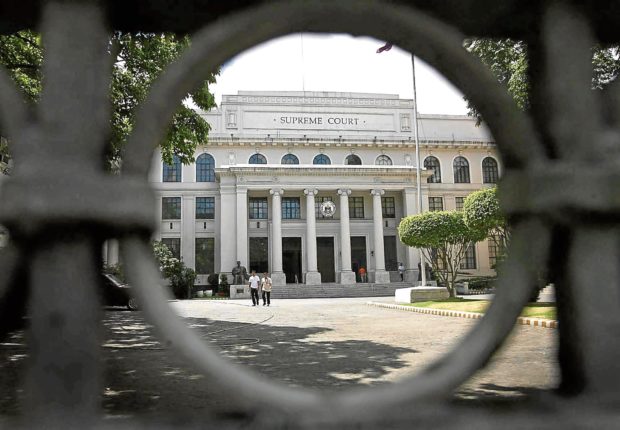
The Supreme Court building is viewed from its closed gateway. (INQUIRER FILE PHOTO)
MANILA, Philippines — Government lawyers asked the Supreme Court on Tuesday to lift the temporary restraining order against the no-contact apprehension policy (NCAP).
Solicitor General Menardo Guevarra made the request during the oral arguments after the SC set the next oral argument for Jan. 24 next year.
“In light of this development, which is perfectly understandable, the OSG [Office of the Solicitor-General], on behalf of the LTO [Land Transportation Office] and MMDA [Metropolitan Manila Development Authority], respectfully request for the immediate lifting of the TRO,” Guevarra said.
On Aug. 30, the SC indefinitely stopped the implementation of the NCAP after several petitions were filed assailing its constitutionality.
Petitioners include Kilusan sa Pagbabago ng Industriya ng Transportasyon Inc. (KAPIT), Pangkalahatang Sangguniang Manila and Suburbs Drivers Association Nationwide (Pasang-Masda), Alliance of Transport Operators and Drivers Association of the Philippines (ALTODAP), and Alliance of Concerned Transport Organization (ACTO) and lawyer Juman B. Paa.
Paa filed a petition before the SC after he was forced to pay huge fines in Manila for four traffic violations, including obstruction of a pedestrian lane, through NCAP. He was required to pay the fines before he was allowed to register his vehicle.
Meanwhile, the transport groups said the NCAP had no legal basis under the MMDA charter and the Land Transportation and Traffic Act (Republic Act 4136).
They argued that NCAP should be declared unconstitutional for being violative of motorists’ constitutional right to due process, for being oppressive and confiscatory, and for violating privacy rights.
But Guevarra said: “The right to use vehicles on public roads is a privilege. That privilege comes not only with a duty to ensure the safety of pedestrians and travelers but also with our collective obligation to ensure that our roads continue to serve the ends of our national economy and benefit every one of us.
“Our concerned national regulatory agencies and local governments have joined hands to ensure this privilege is not abused. Through the NCAP, they have established a mechanism to manage traffic and hold accountable those who abuse their privilege to use our roads. We, therefore, implore this Most Honorable Court to find the NCAP in accord with our laws.”
He said NCAP ordinances notify the registered vehicle owner to contest the violation, including identifying the actual driver.
“This mechanism not only affords the notified party of his due process rights; it also implements the very purpose for which the registered owner rule was established,” he said.
Guevarra added that the local government units’ power to promulgate ordinances to address traffic concerns “is beyond dispute” and “subject only to the requirement that it does not violate any national law and policy.”
“The NCAP ordinances — which establish a system for the capture of the traffic violations and the subsequent identification of the owners of the vehicles involved in such violation for the purpose of ultimately identifying the offending driver — do not in any way contravene any national law or policy,” Guevarra added.
Meanwhile, Chief Justice Alexander Gesmundo said they would study the request of the solicitor general, which is why he asked the petitioners to submit several documents to be taken into consideration before deciding on lifting the restraining order or not. They were given five non-extendible days to submit.